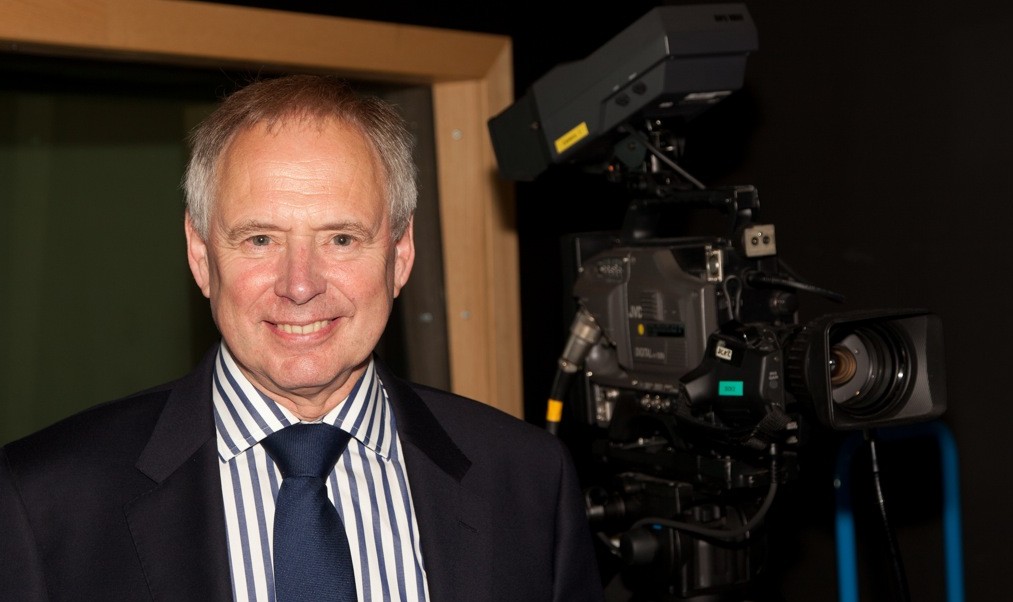Nick Owen has been a fixture on Midlands TV screens for 32 years now. Today, he is the main presenter on the BBC’s Midlands Today and has been for 13 years. Before that there was Central News, the ITV World Cup in 1990, Good morning with Anne and Nick on the BBC until 1996 and, most famously, the time that he, Anne Diamond and Roland Rat saved TV-am (or TV-mayhem! as it had became known) in 1983.
Last Wednesday, Owen shared his secrets with students and others at Coventry University’s renowned Coventry Conversation series. He spoke to a full house and gave candid advice to aspiring journalists:
“The media is saturated. Whatever you do, give 110 per cent. The most important thing is to be yourself, be totally sincere and authentic and talk to people as though everyone matters.”
Owen, who had taken time off from the BBC Mailbox newsroom to come to Coventry, revealed that he still got excited about appearing live on screen.
“Buzz isn’t the right word. There’s so much going on in your ear. You can hear up to ten people talking but I still get keyed up when going on air.”
In recent years the BBC has built the BBC News ‘brand’: taking the English regions under the umbrella of the News Division and homogenizing the look nationwide. Owen is not a total convert to this kind of branding: “I would love our programme to be more distinctive. The move in the BBC is to rationalize local news. It is a pity because even the lightest stories are being pushed aside.”
But at least now he has the resources of the BBC behind them. At TV-am back in 1983 the cupboard was bare after the Famous Five Presenters – Michael Parkinson, David Frost, Angela Rippon, Anna Ford, and Robert Kee – who had won the franchise, had moved on. Owen was called from the sports desk to present by new editor in chief Greg Dyke. Dyke chose Anne Diamond – then at the BBC but previously with Owen at Central TV – to co-present. Much was made of the sexual chemistry between Anne and Nick, but Owen was having none of it when he spoke at Coventry: “Sexual chemistry? It was nothing serious, we were just mates, she laughed at my jokes..”
The nadir of his TV career was when an IRA bomb went off at the Tory Conference in October 1984, John Stapleton, then a TV-am reporter, had left Brighton so TV-am were exposed: “We were left with one man in a remote studio and me in London with another man for two hours.” Despite the bad days, he is proud to have been a part of the saving of TV-am, he said.
Owen had advice for the presenters of Daybreak, with Adrian Chiles and Christine Bleakley. Launched barely a month ago, the show is already possibly destined for broadcasting’s intensive care unit. His advice was that they don’t try to make their former hit The One Show at breakfast time, and have competitions that are a little bit more difficult than “how much is a century, 25, 50, or 100 years?”
From his success at breakfast, Own went back to sport – his first love. He presented the Olympic Games for ITV in 1988, the World Cup in 1990 and Midweek Sports Special for many years. He got used to the different pace of presenting on ITV due to advertising: It’s more difficult because of the commercials. You lose track and spontaneity.”
On TV-am Owen was bit of a boy next door type, but in TV he is a true broadcast veteran. Should he be the old man next door perhaps?
John Mair is a senior lecturer in broadcasting at Coventry University. He founded and produces the twice weekly Coventry Conversations. All are available on podcast at www.coventry.ac.uk/coventry conversations
